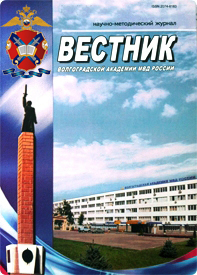The article justifies the relevancy of the empire concept in the context of global development tendencies related to the globalization processes and a new phase of technological revolution. These conditions foster the restoration of the empire concept and the renovation of imperial state. Considering that during the last five centuries Russia was built and developed as an empire, and it still retains many of the empire structure features, the author makes an attempt to identify and explain the state and legal attributes of an empire as the highest nationhood state and to define it. Imperial nationhood combines special ethnocultural, social, spatial and government-organizational features that interpenetrate each other and merge. Being a political and territorial existence form of a local civilization, an empire includes a set of diverse countries and nations having different statuses with respect to the central authorities, which presumes a combination of unitarianism, federalism, confederalism, self-administration and decentralization principles in the presence of a persistent tendency to centralized unitarianism in its territorial organization. That explains why an empire’s sovereign center forms considerably strict hierarchical subordinate relations with provinces when solving the issues of all-empire importance and pursues relatively mild coordination over all other issues of state importance. This reveals the key political and legal attribute of an empire, i.e. the unity of political territory and the unity of empire sovereignty towards the outside world as an exclusive sphere of the empire center and international status of the empire as a great power.
empire, state, sovereignty, local civilization, globalization, supreme authority, political and territorial order, form of government, culture, territory
1. Sultanov Sh. Global'naya voyna ili mirovaya revolyuciya? Vospominaniya o buduschem // Zavtra. 2014. № 45.
2. Kissindzher G. Diplomatiya. M., 1997. S. 734, 735; Hantington S. Stolknovenie civilizaciy. M., 2003.
3. Utkin A. I. Amerikanskaya imperiya. M., 2005.
4. Baburin S. N. Mir imperiy: territoriya gosudarstva i mirovoy poryadok. SPb., 2005.
5. Yavich L. S. O filosofii prava na XXI vek // Pravovedenie. 2000. № 4.
6. Bek U. Vlast' i ee opponenty v epohu globalizma. Novaya vsemirno-politicheskaya ekonomiya. M., 2007; Hardt M., Negri A. Imperiya. M., 2004.
7. Kaspe S. I. Imperiya i modernizaciya. Obschaya model' i rossiyskaya specifika. M., 2001.
8. Hantington S. Stolknovenie civilizaciy. M., 2003.
9. Dugin A. G. Chetvertyy put'. Vvedenie v Chetvertuyu Politicheskuyu Teoriyu. M., 2014.
10. Makinder H. Dzh. Geograficheskaya os' istorii // Klassiki geopolitiki XX veka. M., 2003.
11. Poslanie Prezidenta Rossii Federal'nomu sobraniyu Rossiyskoy Federacii. 25 aprelya 2005 goda [Elektronnyy resurs]. URL: http://www.rg/2005/04/25/poslanie-text.html (data obrascheniya: 18.12.2014).
12. Karpec V. I. Rus' Merovingov i koren' Ryurika. M., 2006.
13. Fursov A. I. Russkaya vlast', Rossiya i Evraziya: Velikaya Mongol'skaya derzhava, samoderzhavie i kommunizm (tres-tres grand espace dans une tres-tres longue duree) // Fursov A. I. Russkiy interes. M., 2014. S. 98-181.
14. Krevel'd M. van. Rascvet i upadok gosudarstva. M., 2006.
15. Filippov A. F. Nablyudatel' imperii (imperiya kak sociologicheskoe ponyatie i politicheskaya problema) // Voprosy sociologii. T. 1. 1992. № 1; Kaspe S. I. Imperiya i modernizaciya. Obschaya model' i rossiyskaya specifika. M., 2001.
16. Vyrazhenie N. Ya. Danilevskogo (Danilevskiy N. Ya. Rossiya i Evropa. M., 1991. S. 85, 87-90 i sled.).
17. Kol'ev A. N. Naciya i gosudarstvo. Teoriya konservativnoy rekonstrukcii. M., 2005.
18. Isaev I. A. Topos i nomos: prostranstva pravoporyadkov. M., 2007.
19. Trubeckoy N. S. Ob idee-pravitel'nice ideokraticheskogo gosudarstva // Trubeckoy N. S. Istoriya. Kul'tura. Yazyk. M., 1995.
20. Velichko A. M. Politiko-pravovye ocherki po istorii Vizantiyskoy imperii. M., 2008.
21. Panarin A. S. Rossiya v ciklah mirovoy istorii. M., 1999. S. 8; Shlezinger A. ml. Cikly amerikanskoy istorii. M., 1992.
22. Miller A. I. Imperiya i sovremennyy mir - nekotorye paradoksy i zabluzhdeniya // Politicheskaya nauka: Sovremennye imperii: sb. nauch. tr. / red. i sost. A. I. Miller. M., 2004.
23. Savel'eva M. Yu. Monarhiya kak forma samoopredeleniya lichnosti. Rossiyskiy opyt stanovleniya fenomena «sakral'noe». Kiev, 2007.
24. Tyugashev E. A. Koncept imperii v gorizonte semiotiki prava // Vestnik Novosibirskogo gosudarstvennogo universiteta. Seriya «Pravo». T. 3. 2007. № 2.
25. Ivanov V. Teoriya gosudarstva. M., 2010.
26. Smolin M. B. Tayny russkoy imperii. M., 2003.









